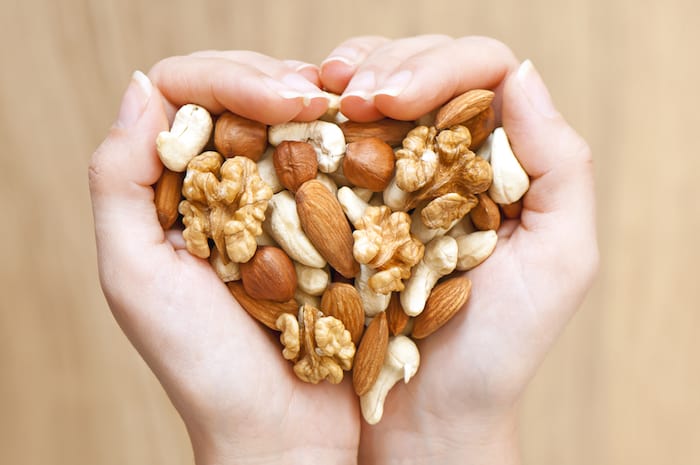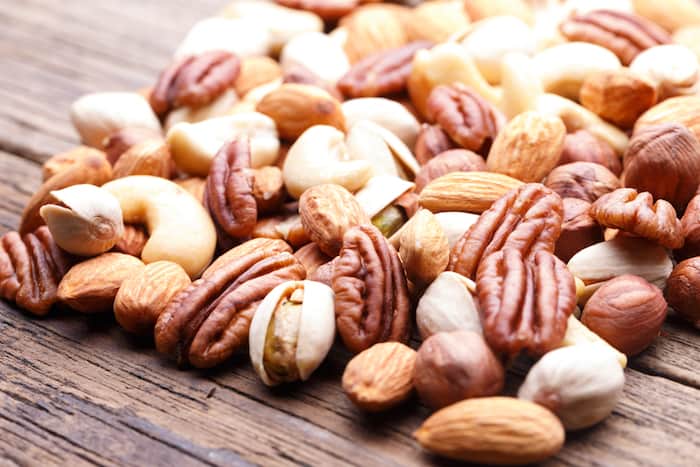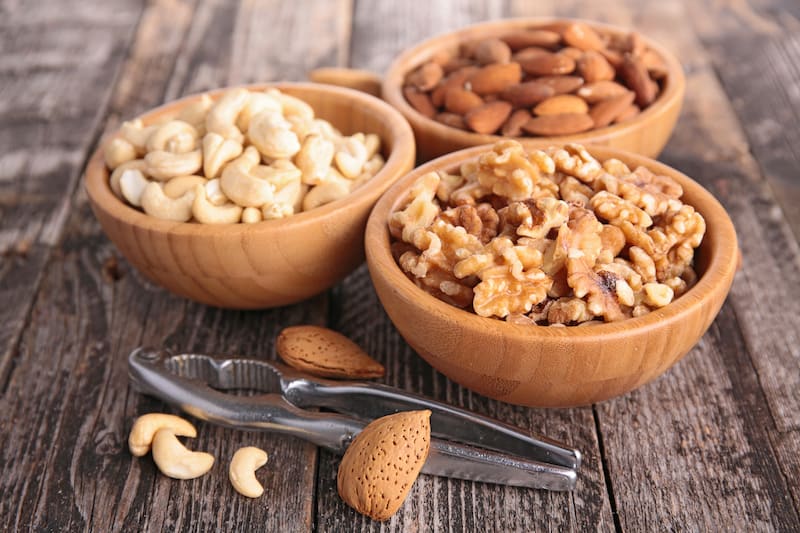Doing a Whole30 can be so confusing sometimes. It seems like rules change constantly, there are so many exceptions to rules and grey areas…it can be completely overwhelming!
Take nuts for example. Some are compliant, some are not allowed at all, and many should only be enjoyed in moderation. It can be hard to keep all this information straight!
Lucky for you we put together this Whole30 nuts mega guide to make things easier and take some of the stress out of the experience.
Nuts are awesome. These crunchy, tasty little nuggets of goodness are a great source of fat with the added bonus of a little boost of protein. They make a great emergency food, salads addition, trail mix component, nut butter…you name it!
When it comes to Whole30, however, there are many opinions on nuts. We’ve sorted this opinions out a bit to hopefully take away some of the mystery!
So…Can I Eat Nuts on Whole30?
Yes. On Whole30, all nuts are allowed. That comes with a caveat, however! While there is no rule banning them, the advice across the board is that nuts should be eaten in moderation.
The only “nuts” that are explicitly not allowed on the program are the peanut and the soy nut, which technically are not even nuts anyways! Both peanuts and soy nuts are members of the legume family and legumes, as we know, are never allowed on Whole30.
For nuts that are actually what they claim to be (true nuts, that is), the rules get a little more complicated.

Eat Them…But Don’t “Go Nuts”
While technically nuts and seeds are not banned from Whole30, there are many reasons that limiting your intake is highly recommended.
First of all, nuts are very caloric and easy to overeat—that alone is a good reason to keep an eye on your nut consumption! Weighing in at a whopping 718 calories per 100g, macadamia nuts contain the highest caloric density of them all. You get a lot of caloric bang for your buck with these little guys.
Consequently, nuts are best regarded as a condiment or supplement to an already balanced diet of vegetables, well-sourced meats, dietary fats and low-sugar fruits…or the occasional emergency snack when you’re running errands or traveling all day. We’ve all been there.
The Great PUFA Debate: How Some Fats Cause Inflammation
There are a few relevant buzzwords that have been floating around the Whole30 and Paleo blogosphere lately regarding the consumption of nuts: PUFA, Omega-6, Omega-3…ring a bell?
PUFAs are polyunsaturated fats—one of the three main types of fat alongside monounsaturated fat and saturated fatty acids. PUFAs get so much flack because by nature, their structure is very unstable, therefore making it very easy to become oxidized.
Once PUFAs become oxidized (through exposure to heat, oxygen, or light), they become inflammatory, contributing to chronic illness such as diabetes, metabolic disorder, autoimmune issues, and many more; No one wants inflammation!
Omega-3 vs. Omega-6
The two main types of PUFA are Omega-6 and Omega-3. Omega-3s are most commonly found in plant-based fat-sourced as well as seafood (salmon is popular for getting some good Omega-3s in your diet!).
Omega-6s are the ones to look out for. These are often found in processed cooking oils such as soybean and corn oil…but also, unfortunately, in many nuts. While they are not inherently bad, Omega-6 is much more heavily represented in our western diets.
When Omega-6 is present in a much higher ratio than Omega-3, inflammation occurs, leading to all those nasty chronic illnesses we mentioned before.

Nuts Are Not Evil!
Don’t let PUFAs scare you too much, though! Whole30 is designed to get your Omega-6 and Omega-3 ratios back on track by cutting out commercial cooking oils and promoting the consumption of fish, avocados and coconut oil (all amazing, low-PUFA fats!).
Nuts, while commonly high in PUFAs, are not the enemy here. They contain antioxidants that should help protect the fat and are a fairly complete nutritional source that will keep you satiated.
They are meant to be consumed a little bit at a time—a salad topping, a small handful with a meal, etc. Eating nuts in moderation (a 1/4 cup serving per day or less) is not going to hurt you.
Nuts are a great way to diversify your Whole30 experience by adding a savory, satisfying crunch to many dishes. If you feel like you are likely to abuse them, however, you may want to rethink including them in your Whole30. If you are known to accidentally wolf down an entire bowl of trail mix in one sitting, it might be a good time to take a break from nuts for the month.
Not All Nuts Are Created Equal
Because of the variance in the nutritional content of each different type of nut, there are certainly some nuts that are better than others.
On Whole30, some nuts are given the green light as good sources of dietary fat, some are to be consumed occasionally, and some are to be limited.
These guidelines are based on the Omega-6 to Omega-3 ratios—the nuts that are considered “good eating fats” have the lowest PUFA content of all the nuts out there. For sake of convenience, we have them organized here for you!
Ideal Nuts – Choose These First:
- Macadamia nuts (these are the clear winner!)
- Hazelnuts/filberts
- Cashews
Okay Nuts – Eat These Occasionally:
- Almonds
- Brazil nuts
- Pecans
- Pistachios
Nuts to Limit:
- Flax seeds
- Pine nuts
- Pumpkin seeds/pepitas
- Sesame seeds
- Sunflower seeds
- Walnuts
Nuts that are not actually nuts (and are not allowed):
- Peanuts
- Soy nuts
Nuts Are Everywhere
Chances are if you’ve been looking up paleo recipes to make on your Whole30, you’ve seen a lot of nuts.
They are pretty heavily relied upon in many recipes, especially when it comes to baking. You see nuts in many forms…nut butters, nut flours, trail mixes, etc.
It is important on Whole30 to be aware of your nut consumption so you don’t overdo it, so keep that in mind when you are planning your meals and snacks. If you plan on eating an almond-based paleo-style “oatmeal” for breakfast, you will definitely want to skip your go-to snack of cashew butter and apple slices later that day. It’s all a balance!
How do you use nuts on your Whole30? Do you eat them at all? Confused about anything we covered in this post? Leave us a comment below!





Why did you put those certain nuts under the “limit” category? Some of them are suppose to be so healthy for you…
Hi Denise – I think we explained pretty clearly in the article while some nuts should be consumed in moderation on the Whole30 diet. Try reading through again for the details. Some nuts have higher omega-6 than is ideal, which is why they should be consumed in limited quantities.
Also, remember, this is based on Whole30 regulations and rules, not just for those trying to follow a general healthy diet.
How do you cook your nuts or if you purchase – what should they be cooked in? Can you give me a “trail mix” idea of what to have for emergency snack to carry along in my purse? Thanks
Hi Linda – you don’t need to cook your nuts at all. For a trail mix, I’d suggest just combining some of your favorite nuts – almonds, walnuts, sunflower seeds. Dried cranberries – if you can find them without added sugar, which is nearly impossible!
What about drink coffee with almond milk as a creamer?
Check out our guide to Whole30 coffee! https://lifehealthhq.com/whole30-coffee/
hi i want some vegetarian food without egg .please send me those recipe
Just curious as to why nuts are ok on an elimination diet when they’re known to be common allergens?
Good question! This might help answer your question: https://forum.whole30.com/topic/14321-grains-are-bad-tree-nuts-are-ok-i-dont-get-it/.
Nuts are a healthy source of fats for many people, but if you’re not seeing results with Whole30, cutting out nuts may definitely show an improvement.
I would love to see more Whole30 Pescatarian recipes. Thank you!
We have a ton of Whole30 Fish and Whole30 Chicken recipes! 🙂
For nuts, many of these are salted after roasting in vegetable oil or even peanut oil. Are these compliant? If not, do you have suggestions for not having to eat dry roasted/unsalted nuts?
I’m afraid those are not compliant – unless you can find nuts roasted in olive oil!
My partner eats about 1.5 cups of pistachios every other night… we’ve been on the whole30 for 60+ days and I’m concerned about whether his pistachio consumption is sabotaging the plan.
Nuts are definitely supposed to be a moderation food, so it might be time to slow them down!